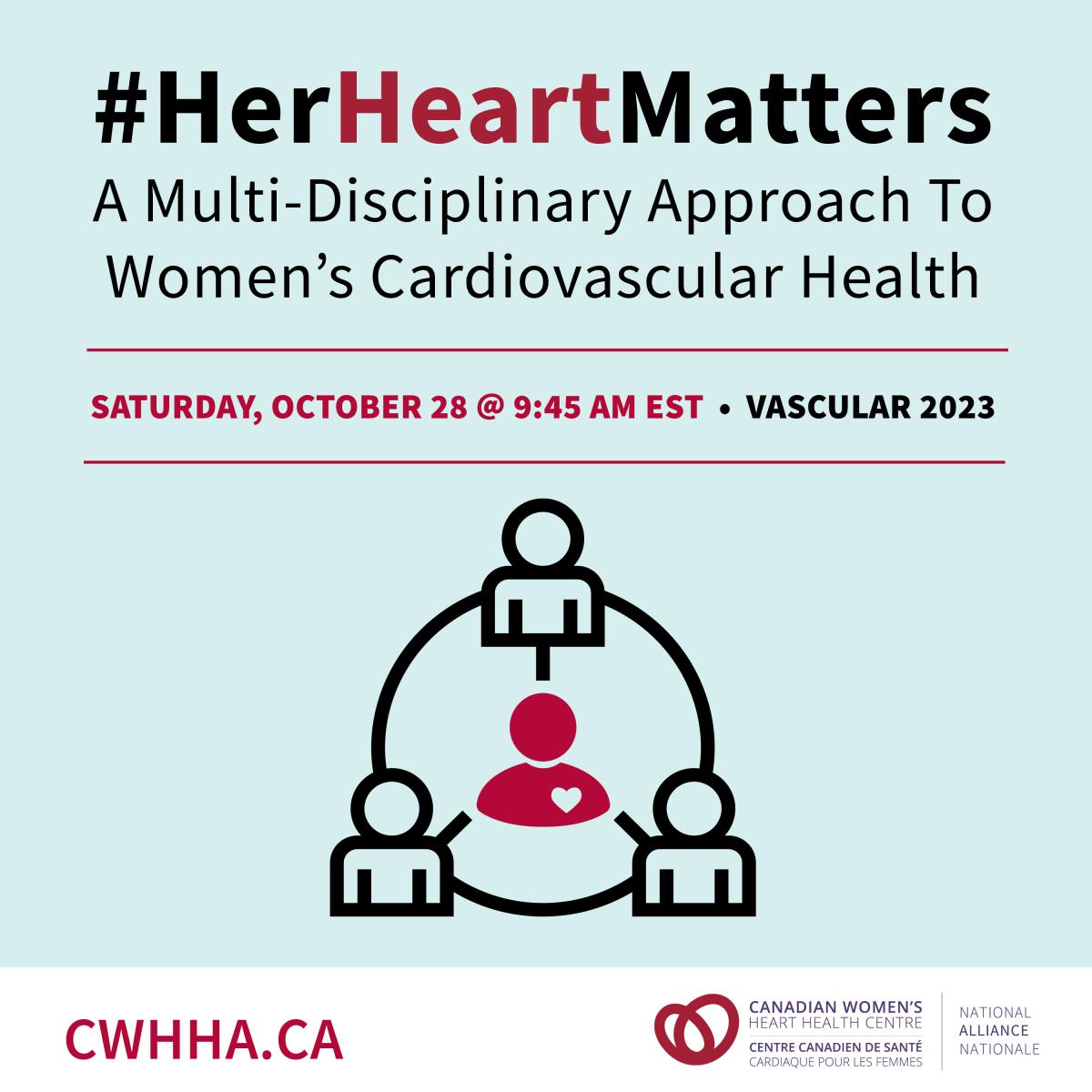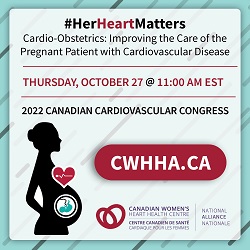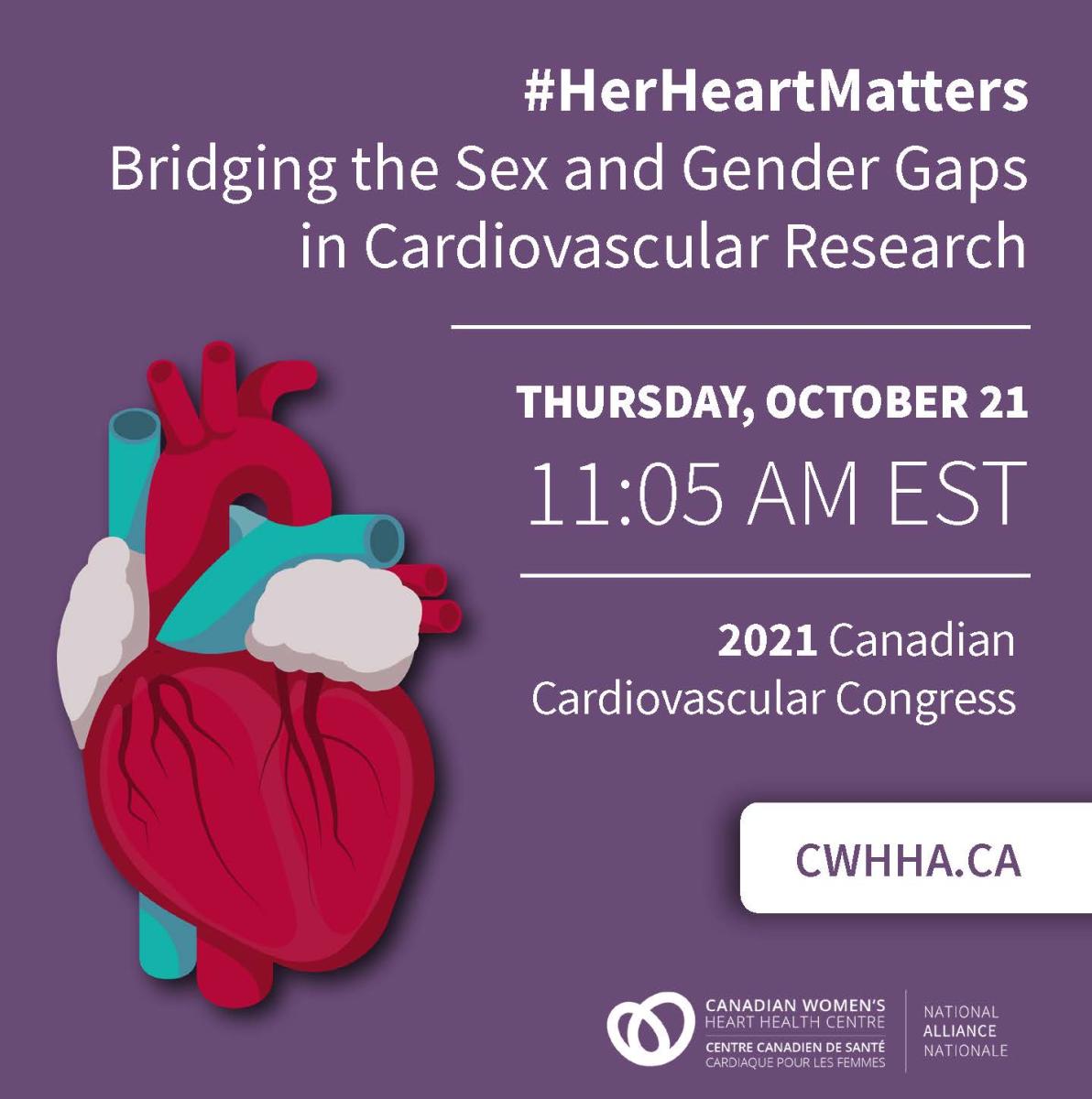| 2022 | 2021 |
2023
#HerHearMatters: A Multi-disciplinary Approach to Women's Cardiovascular Health
 Vascular 2023
Vascular 2023
Learning Objectives:
At the conclusion of this session, participants will be able to:
1) Explain female and gender-specific emerging risks for cardiovascular disease across the lifespan;
2) Describe an multi-disciplinary and intersectional approach to the signs and symptoms of heart disease in women;
3) Discuss the current science and knowledge related to the different types of heart disease in women;
4) Describe the emerging multi-disciplinary initiatives that Canadian Women’s Heart Health Alliance (CWHHA) members are involved in to educate and increase awareness of women’s heart health in Canada; and
5) Identify one actionable takeaway for your multi-disciplinary healthcare team.
Cardiovascular disease (CVD) can affect women differently than men and the impact on women has traditionally been underappreciated. Healthcare teams can do more together to improve a woman's heart health journey. The leading cause of preventable death in women in Canada is heart disease. Novel and multi-disciplinary approaches to increase awareness about the unique and emerging risk factors, signs and symptoms, and the types of heart disease in women are urgently needed.
In this workshop, members of the Canadian Women’s Heart Health Alliance (CWHHA) (a national alliance of providers, researchers, and women with lived experience whose aim is to enhance knowledge translation, education and awareness of critical issues in women’s cardiovascular health) will address the risk factors of CVD throughout a woman’s lifespan, the signs and symptoms most often presented by women, and the types of heart disease women are more likely to have compared to men. The workshop will also highlight important initiatives being implemented across Canada to increase awareness and knowledge among healthcare teams, with actionable items participants can use in their day-to-day practice. An multi-disciplinary and intersectional lens will be used to present this emerging evidence grounded in science, with ample opportunity for participant engagement and interactivity. Participants working with women across the lifespan will benefit from the information gained in this workshop.
The workshop will be presented as outlined below:
-
Women with lived experiences from across Canada will provide valuable patient perspectives in their ‘Heart Stories’ through a pre-recorded video.
-
Nicole Tegg will give an overview of unique and emerging risk factors across a woman’s lifespan, including menarche, pregnancy, perimenopausal and menopausal risk factors, cancer diagnosis and treatment, polycystic ovary syndrome, and rheumatic autoimmune diseases.
-
Dr. Monica Parry will highlight recent guidelines and suggest a multi-disciplinary and intersectional approach to the signs and symptoms of heart disease in women.
-
Dr. Sharon Mulvagh will describe the types of heart disease women are more likely to have compared to men.
-
Nazli Parast and Patrice Lindsay will provide insight into important Canadian initiatives and projects targeting women’s heart health.
-
Finally, Laura Avelar and Jennifer Harris will highlight new developments in the management of women’s heart health and actionable items for healthcare teams working in both acute care and rehabilitation.
References
2022
#HerHeartMatters: Cardio-Obstetrics: Improving the Care of the Pregnant Patient with Cardiovascular Disease
 Canadian Cardiovascular Congress (CCC)
Canadian Cardiovascular Congress (CCC)
Target Audience: All cardiovascular (clinical and research) health professionals, Academic cardiovascular health professionals and researchers, Trainee (clinical)
Learning Objectives
At the conclusion of this session, participants will be able to:
1) Define the scope of cardio-obstetrics and discuss the importance of a pregnancy heart team.
2) Describe current challenges and gaps in cardio-obstetrics care, including the impact of social determinants of health (e.g., race, ethnicity, socioeconomic factors). Identify strategies to bridge these gaps.
3) Identify current initiatives and available resources for patients and health care professionals in the field of cardio-obstetrics.
Cardiovascular disease (CVD) is the number one killer of Canadian women and one of the leading causes of maternal mortality in North America. The prevalence of CVD in women of childbearing age is increasing, due to higher survival rates of patients with pediatric / congenital heart disease into their reproductive years, older maternal age at first pregnancy, and higher prevalence of underlying CVD risk factors in pregnant women. Furthermore, complications of pregnancy, such hypertensive disorders of pregnancy (e.g., pre-eclampsia), are associated with a significantly higher risk of premature CVD and other adverse outcomes in women.
Cardio-obstetrics is an emerging subspecialty of cardiology, focusing on prevention, early detection, and appropriate management of CVD from pre-conception through the postpartum period. Despite the critical importance of cardiovascular health in pregnancy, women and health care professionals remain unaware of the acute and long-term cardiovascular complications of pregnancy, baseline cardiovascular conditions of concern in women considering pregnancy, feto-maternal cardiovascular complications, and appropriate maternal cardiovascular screening and follow up. Moreover, substantial disparities and obstacles exist in accessing cardio-obstetric care among Canadian women across the country.
In this workshop, members of the Canadian Women’s Heart Health Alliance (CWHHA) will address the purpose and goals of a cardio-obstetric program, its associated geographic, ethical and cultural challenges, potential keys to bridging these gaps, and current initiatives and resources available in Canada.
We will do this by using the outline below:
- Ms. Laura Avelar will provide a valuable patient perspective by sharing her unique heart story.
- Dr. Habibat Garuba will give an overview of the scope of cardio-obstetrics, and cardiovascular physiology during pregnancy, labour, delivery, and post-partum. She will discuss maternal cardiac risk assessment tools, diagnostic imaging considerations, medication safety, and the importance of a multidisciplinary pregnancy heart team.
- Dr. Laurie-Anne Boivin-Proulx will provide insight into the geographical barriers to accessing cardio-obstetric care in Canada, and ethical considerations in situations in which pregnancy is contraindicated.
- Ms. Amy Johnston will describe key socio-demographic determinants of cardio-obstetric health, and outline recommendations to address disparities in cardio-obstetric care and delivery.
- Finally, Dr. Amélie Paquin will speak to initiatives that are currently underway in Canada, available programs and services, and practical takeaways and resources for women and healthcare professionals.
Cardio-Obstetrics Resources
Guidelines, Best Practices, and Scientific Statements
- Canadian Cardiovascular Society: Clinical Practice Update on Cardiovascular Management of the Pregnant Patient (2021)
- Canadian Cardiovascular Society: Diagnosis and Management of HF: Update 2010. HF in ethnic minority populations, HF and pregnancy, disease management and quality improvement/assurance programs
- Hypertension Canada’s 2018 Guidelines for the Management of Hypertension in Pregnancy
- ESC Clinical Practice Guidelines: Cardiovascular Diseases during Pregnancy (Management of) Guidelines (2018)
- Canadian Stroke Best Practices: Acute Stroke Management During Pregnancy
- Canadian Stroke Best Practices: Prevention of Recurrent Stroke in Pregnancy
Reviews of the Literature
- Cardiovascular Considerations in Caring for Pregnant Patients: A Scientific Statement From the American Heart Association (2020)
- JACC State-of-the-Art Review: Peripartum Cardiomyopathy (2019)
- JACC State-of-the-Art Review: Use of Medication for CVD During Pregnancy (2019)
- JACC State-of-the-Art Review: Summary of Updated Recommendations for Primary Prevention of Cardiovascular Disease in Women (2020)
- State of the science in women's cardiovascular disease: a Canadian perspective on the influence of sex and gender.
- The Canadian Women’s Heart Health Alliance ATLAS on the Epidemiology, Diagnosis, and Management of Cardiovascular Disease in Women
- The Lancet women and cardiovascular disease Commission: reducing the global burden by 2030
Training and Education
- Canadian Women’s Heart Health Education Course + Teaching Toolkit
- Canadian Cardiovascular Society Antiplatelet Guidelines: Use of Antiplatelet Therapy in Women who are Pregnant or Breastfeeding
- 2023 Canadian Women’s Heart Health Summit, April 28-29 | Vancouver, BC
- Podcasts: cardionerds.com/cardio-obstetrics
Social Media Hashtags
2021
#HERHEARTMATTERS: Bridging the Sex and Gender Gaps in Cardiovascular Research

Canadian Cardiovascular Congress (CCC)
View #HerHeartMatters Presentation (PDF)
Target Audience: General: All cardiovascular (clinical and research) health professionals, Academic cardiovascular health professionals and researchers, Trainee (clinical)
Learning Objectives:
At the conclusion of this session participants will be able to:
1) Name structural barriers to gender-equal research participation, representation, and leadership in cardiology;
2) List multi-level strategies that can bridge the gender gaps in cardiovascular research leadership; anda
3) Recognize implicit biases as they relate to sex and gender and identify ways to tackle them.
Cardiovascular disease is the number one killer of Canadian women. Despite this, awareness to diagnose, treat and manage cardiovascular disease in women remains suboptimal. It does not have to be this way. In order to see fewer women with reduced quality of life, fewer women in emergency departments and dramatically fewer women dying from heart disease, we must focus on bridging the sex and gender gaps at the research level.
In this workshop, members of the Canadian Women’s Heart Health Alliance will address women’s participation and representation in cardiovascular clinical trials and research leadership, structural barriers to gender-equal research and other trial-design outcomes, and strategies to help close these gaps to improve women’s cardiovascular health.
We will do this by using the outline below:
- Karen E. Jacques will provide a valuable patient perspective by sharing her unique heart story, her experience participating in a research study, and the role of patient advocate as it relates to research;
- Dr. Colleen Norris will discuss women’s participation, representation and other aspects of trial diversity in clinical trials in cardiology using her work on STEMI guidelines as well as women in AF trials;
- Dr. Harriette Van Spall will explore structural barriers to gender-equal research leadership and present multi-level strategies to address them - including at the trial design, academic institution, funding, medical journal, national society, and scientist/collaborator levels;
- Dr. Varinder Randhawa will close the panel by highlighting the need to recognize and tackle implicit bias as it relates to gender in research settings.

